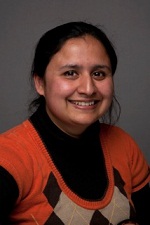 My interest in environmental science and education began with my own experiences in field research environments. There always seemed to be a gap between the caliber of scientific research in environmental science and the level of public understanding about it. This made me curious about what constituted learners’ conceptual understandings about critical science issues and if there were specific tools that could be designed to assess and improve it.
My interest in environmental science and education began with my own experiences in field research environments. There always seemed to be a gap between the caliber of scientific research in environmental science and the level of public understanding about it. This made me curious about what constituted learners’ conceptual understandings about critical science issues and if there were specific tools that could be designed to assess and improve it.
I found myself specifically engaged in the context of Global Climate Change Education. Even though there have been massive efforts to mitigate the effects of global climate change (GCC), the research and practice for promoting climate literacy and understanding of GCC have only recently become a national priority in the U.S. For instance, the National Research Council’s 2012 report, Framework for K-12 Science Education recently emphasized student reasoning, argumentation skills and understanding of GCC and therefore dictates two responsibilities for teachers:
- Foster conceptual clarity in students.
- Promote innovation, resilience, and readiness in students so they can respond to the threat of a changing environment.
Past research in teacher understanding of the science and basics of GCC has shown that in spite of prevalent frameworks such as the Essential Principles for Climate Literacy, teachers continue to struggle in understanding the science behind GCC. Misinformed perceptions about basic climate science content and the role of human activities in the GCC scenario are persistent. Consequently, we need extensive efforts focused on both improving and assessing teachers’ conceptual understanding about the science behind GCC.
My doctoral dissertation, with support of University of Minnesota’s Doctoral Dissertation Fellowship, develops multi-pronged methods that are capable of eliciting a learner’s overall construct of knowledge about GCC. This study, which uses multiple tools for assessment of teachers’ understanding, will also reveal their misconceptions and the gaps in the knowledge of science teachers about GCC. Such information is both novel and critical for science educators in designing materials intended for teachers’ professional development.
The Doctoral Dissertation Fellowship has allowed me to focus all my efforts towards the pursuit of this research, helping me make solid progress while doing high quality work. I am thankful to my adviser Dr. Gillian Roehrig for her guidance and my peers for their support throughout this process. I look forward to completing my project in May 2014 and am preparing for the academic job market in the fall of 2014.



